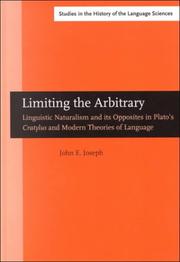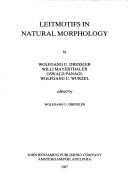| Listing 1 - 6 of 6 |
Sort by
|

ISBN: 1556080255 Year: 1989 Publisher: Dordrecht Kluwer
Abstract | Keywords | Export | Availability | Bookmark
 Loading...
Loading...Choose an application
- Reference Manager
- EndNote
- RefWorks (Direct export to RefWorks)
Grammar --- Grammar, Comparative and general --- Naturalness (Linguistics) --- Flexion (Linguistique) --- Naturalité (Linguistique) --- Inflection --- Inflection. --- Naturalness (Linguistics). --- Naturalité (Linguistique)

ISSN: 03040720 ISBN: 9781556197499 1556197497 9027245851 9786613174604 128317460X 9027283729 9789027283726 9781283174602 9789027245854 6613174602 Year: 2000 Volume: 96 Publisher: Amsterdam Benjamins
Abstract | Keywords | Export | Availability | Bookmark
 Loading...
Loading...Choose an application
- Reference Manager
- EndNote
- RefWorks (Direct export to RefWorks)
The idea that some aspects of language are 'natural', while others are arbitrary, artificial or derived, runs all through modern linguistics, from Chomsky's GB theory and Minimalist program and his concept of E- and I-language, to Greenberg's search for linguistic universals, Pinker's views on regular and irregular morphology and the brain, and the markedness-based constraints of Optimality Theory. This book traces the heritage of this linguistic naturalism back to its locus classicus, Plato's dialogue Cratylus. The first half of the book is a detailed examination of the linguistic arguments in the Cratylus. The second half follows three of the dialogue's naturalistic themes through subsequent linguistic history - natural grammar and conventional words, from Aristotle to Pinker; natural dialect and artificial language, from Varro to Chomsky; and invisible hierarchies, from Jakobson to Optimality Theory - in search of a way forward beyond these seductive yet spurious and limiting dichotomies.
Language and languages --- Naturalness (Linguistics) --- Philosophy. --- Plato. --- Langage et langues --- Naturalité (Linguistique) --- Philosophy --- Philosophie --- Historical linguistics --- Plato --- Natural class (Linguistics) --- Linguistics --- Langage --- Philosophie du langage --- Platon (0427?-0348? av. j.-c.) --- Platon (0427?-0348? av. j.-c.). cratyle --- Signe (linguistique)

ISBN: 3110147955 3110908999 Year: 1996 Volume: 92 Publisher: Berlin de Gruyter
Abstract | Keywords | Export | Availability | Bookmark
 Loading...
Loading...Choose an application
- Reference Manager
- EndNote
- RefWorks (Direct export to RefWorks)
No detailed description available for "Natural Phonology".
Grammar, Comparative and general --- Naturalness (Linguistics) --- Phonology --- Congresses. --- Phonetics --- Phonologie --- Naturalité (Linguistique) --- Congresses --- Congrès --- Natural class (Linguistics) --- Linguistics --- Comparative grammar --- Grammar --- Grammar, Philosophical --- Grammar, Universal --- Language and languages --- Philosophical grammar --- Philology --- Phonology&delete& --- Grammar, Comparative

ISSN: 01657763 ISBN: 9027230099 9027283133 1283222493 9786613222497 9789027283139 9789027230096 Year: 1987 Volume: 10 Publisher: Amsterdam Benjamins
Abstract | Keywords | Export | Availability | Bookmark
 Loading...
Loading...Choose an application
- Reference Manager
- EndNote
- RefWorks (Direct export to RefWorks)
Natural Morphology is the term the four authors of this monograph agreed on to cover the leitmotifs of their common and individual approaches in questions of theoretical morphology. The introduction summarizes the basic concepts and strategies of Natural Morphology, to be followed by Mayerthaler who deals with universal properties of inflectional morphology, and Wurzel with typological ones which depend on language specific properties of inflectional systems, and Dressler with universal and typological properties of word formation. The final chapter by Panagl is an indepth study of diachronic
801.55 --- Grammar, Comparative and general --- -Naturalness (Linguistics) --- Natural class (Linguistics) --- Linguistics --- Comparative grammar --- Grammar --- Grammar, Philosophical --- Grammar, Universal --- Language and languages --- Philosophical grammar --- Philology --- 801.55 Morfologie--(taalkunde) --- Morfologie--(taalkunde) --- Morphology --- Grammar, Comparative --- Naturalness (Linguistics). --- Morphology. --- Naturalness (Linguistics) --- Morphologie (Linguistique) --- Naturalité (Linguistique) --- Morphology (Linguistics) --- Grammar, Comparative and general Morphology
Book
ISBN: 9783110186062 3110186063 1282425722 9786612425721 3110198975 9783110198973 9781282425729 6612425725 Year: 2009 Volume: 184. Publisher: Berlin Mouton de Gruyter
Abstract | Keywords | Export | Availability | Bookmark
 Loading...
Loading...Choose an application
- Reference Manager
- EndNote
- RefWorks (Direct export to RefWorks)
The volume is dedicated to the German linguist Wolfgang Ullrich "Gustav" Wurzel (1940-2001), who has influenced linguistic thought in his work on paradigm-based morphology. All contributors to the volume deal with Wurzel's work and thinking, who in his theoretical writings focused on the concepts of naturalness, markedness and complexity in human language. The authors discuss diachronic and typological aspects of morphology, i.e. the nature of paradigms, the rise and fall of inflectional morphology, and the development and systems of gender marking, also in regard to the interface with phonolo
Grammar, Comparative and general --- Naturalness (Linguistics). --- Inflection. --- Morphology. --- Wurzel, Wolfgang Ullrich. --- Grammar --- Flexion (Linguistique) --- Morphologie (Linguistique) --- Naturalité (Linguistique) --- Naturalness (Linguistics) --- Natural class (Linguistics) --- Inflectional morphology --- Wurzel, W. U. --- Wurzel, Gustav --- Linguistics --- Morphology (Linguistics) --- Inflection --- Language and languages --- Morphology --- Philology --- Grammar, Comparative and general Morphology
Book
ISBN: 1282154974 9786612154973 902729285X 9789027292858 9027253951 9789027253958 Year: 2006 Volume: .152 Publisher: Amsterdam Benjamins
Abstract | Keywords | Export | Availability | Bookmark
 Loading...
Loading...Choose an application
- Reference Manager
- EndNote
- RefWorks (Direct export to RefWorks)
The study describes a detailed and original piece of research work, investigating a very important genre of human communication, and that is conversation. It provides a definition of the genre of conversation by describing nine features of conversation, namely multiple sources, discourse coherence, language as doing, co-operation, unfolding, open-endedness, artifacts, inexplicitness and shared responsibility. These nine features of naturalness in conversation serve to distinguish conversation from specialized discourse types. The study illustrates the nine defining features of conversation with authentic conversational data collected surreptitiously in England. While this study is of native speakers of English, the nine defining features of naturalness of English conversation are applicable to conversations conducted in other languages.
Conversation analysis. --- Discourse analysis. --- Naturalness (Linguistics) --- Natural class (Linguistics) --- Linguistics --- Discourse grammar --- Text grammar --- Semantics --- Semiotics --- Analysis of conversation --- CA (Interpersonal communication) --- Conversational analysis --- Oral communication --- Conversation analysis --- Discourse analysis --- Analyse de la conversation --- Analyse du discours --- Naturalité (Linguistique) --- Pragmatics --- Naturalness (Linguistics).
| Listing 1 - 6 of 6 |
Sort by
|

 Search
Search Feedback
Feedback About UniCat
About UniCat  Help
Help News
News